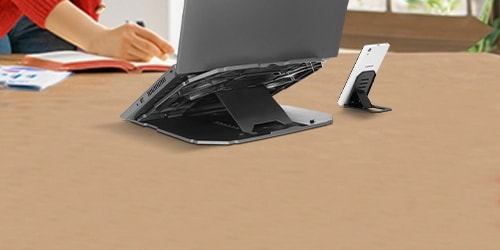Lenovo’s Privacy Statements have recently been updated. Please click here to view these statements.
-
Accessibility
-
Contact Us
Sales:
Order Support:
-
Rewards
-
Account
-
Cart
-
Discover the latest PCs at Lenovo.com >
|
Stands Arms & Mounts
Shop Lenovo and find your ideal ergonomic positioning for an improved computing experience. Available universal stands, arms and mounts from top brands, plus solutions for your favorite Lenovo laptops and PCs.
Sorry, there are no results.
What are the different monitor mounts?
There are a few different types of monitor mounts, each with their own advantages. The most common type is the desk mount, which attaches the monitor to the edge of a desk or table. This is a great option if you have limited space, as it frees up plenty of room on your desktop. Another popular option is the wall mount, which allows you to suspend your monitor from the wall. This is ideal for saving desk space, but it can be tricky to align the monitor correctly. Finally, there are freestanding mounts, which use a heavy base to support the monitor. These are perfect for situations where you can't or don't want to drill holes in your walls. No matter what type of setup you have, there's sure to be a monitor mount that's perfect for you.
Can any monitors be mounted?
Most monitors can be mounted on a wall or placed on a desk, but there are a few important factors to consider before making your purchase. First, take into account the size and weight of the monitor. If it is too large or heavy, it may not be compatible with certain types of mounts. Second, consider the connections that the monitor has. Make sure that it has the right type of port for the mount that you plan to use. Finally, check the VESA mount specifications to make sure that the monitor will fit onto the mount. Also, consider any additional features that you may need, such as tilt adjustment or cable management. With a little bit of planning, mounting your monitor is a great way to maximize your workspace.
How do I know what Mount to get for my monitor?
Mounts come in all shapes and sizes, and it can be tricky to figure out which one is right for your monitor. The first thing to consider is the size of your monitor. If you have a small monitor, you'll need a small mount. But if you have a large monitor, you'll need a large mount. The next thing to consider is the weight of your monitor. Some mounts are designed for lightweight monitors, while others are designed for heavy monitors. Finally, you'll need to decide where you want to mount your monitor. Some mounts are designed for desktops, while others are designed for walls. You'll also need to decide on the features you want in a mount. Some mounts offer more adjustable options than others, so it's important to choose one that will give you the flexibility you need.






